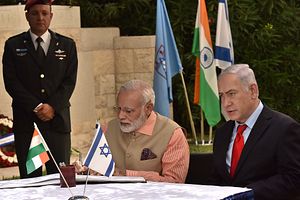Indian Prime Minister Narendra Modi’s visit to Israel last week generated a lot of interest in Pakistan for a range of reasons. While the conspiracy theorists touted the trip as the formal confirmation of a “Zionist-Hindu” plot to launch a nuclear attack on Pakistan – and Islam – the more realistic debate centered around the range of arms deals signed between the two countries.
These deals include the purchase of 8,000 Spike anti-tank missiles from Israel’s Rafael Advanced Defense Systems, which was finalized in 2014. This is in addition to the Barak 8 air defense systems that India would purchase from Israel Aerospace Industries, for use on both land and water.
Last month, an Indian naval contingent headed by the navy chief participated in a five-day drill in Israel.
“They have a threat from Pakistan, so India is trying to learn from things we have that are similar,” a senior Israeli Navy officer told Haaretz at the time. “We plan to continue to cooperate to see where the challenges overlap. It’s a mutual need.”
Three months from now Indian pilots will be in Israel for the Blue Flag air force training exercise. And if all agreements go ahead as planned, 2017 would be a record year for Israel’s arms sales to India – the world’s largest weapons importer in recent years.
A day before Modi’s arrival, the Israeli foreign ministry reiterated mutual cooperation in the fight against terrorism. “We are both suffering from the same scourge. I really don’t see any difference between the Lashkar-e-Taiba and the Hamas… A terrorist is a terrorist,” said the deputy director general of Israel’s foreign ministry, Mark Sofer, ahead of the visit.
This mirrored the U.S. State Department sanctioning Hizbul Mujahideen and United Jihad Council leader Syed Salahuddin as a “Specially Designated Global Terrorist” a day before Modi’s trip to the United States. That move came after U.S. President Donald Trump implicitly backed India’s Kashmir stance at an “Islamic summit” in Riyadh.
New Delhi getting Washington and Jerusalem to echo its stance on militancy in Kashmir is not only a diplomatic triumph for Modi, it also underscores the global alienation of all freedom movements that have been taken over by Islamism.
Pakistan, which has backed the Kashmiri independence movement – both ideologically and militarily – on Islamist grounds, has long since been reduced to the lone voice taking up the issue on the international stage. Not only has jihad in Kashmir boomeranged on Pakistan in terms of a precipitous spike in terrorism, it has now left the Kashmiris at the mercy of the Indian security forces, which have upped the human rights abuses in recent months.
Successful Indian diplomacy, which has seen Modi already visit 12 Muslim countries – including Saudi Arabia and Iran – without Kashmir having been brought up, means that the violence committed by the Indian security forces is being formally given a counterterror tag.
With Israel and India conflating militancy in Kashmir and Palestine, Pakistan has two diplomatic cards that it could play.
The first is to reciprocate. Considering that the Palestinian issue has significantly broader global reach, especially at the UN, Pakistan could use it as a vehicle for its Kashmir narrative. The UN Security Council has adopted 47 resolutions against Israel – 18 since last year – while there have been only nine on Kashmir – none since 1957.
The second option would be to reconsider Pakistan’s policy on jihad and Pan-Islamist diplomacy. Not only would this, in the long run, strengthen the claim for Kashmir’s autonomy, Pakistan would be able to shun accusation of harboring jihadists. For while China – Pakistan’s economic lifeline – might have no issues ignoring Islamabad’s support for militants in Kashmir, it won’t allow any ideological backing with its no-nonsense approach toward Islamism.
Consider this: Pakistan’s archrival is busy signing record arms agreements with a state that Pakistan doesn’t even recognize. Not only does this restrict Pakistan’s diplomatic and defense gamut, it also allows India to capitalize on the same.
By not restricting itself to an ideological prism, India has successfully agreed to defense deals with both Saudi Arabia and Israel, without compromising on New Delhi’s economic interests with Iran – the common major foe for both Riyadh and Jerusalem.
Meanwhile, Pakistan is spearheading a Saudi-led military coalition designed against Iran, prompting Tehran to not only reconsider financial dealing with Islamabad but also issue direct military threats of attacks inside Pakistani territory.
The China-Pakistan Economic Corridor could work wonders by allowing others in the region to hop aboard, if Islamabad reconsiders its Islamist takeover of diplomacy and regional security policy. If not, the shroud of jihadism would continue to forestall Pakistan’s progress, both domestically and on the global front.

































